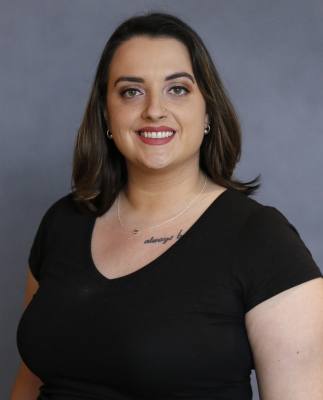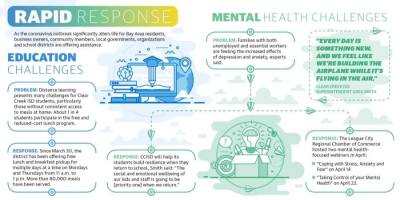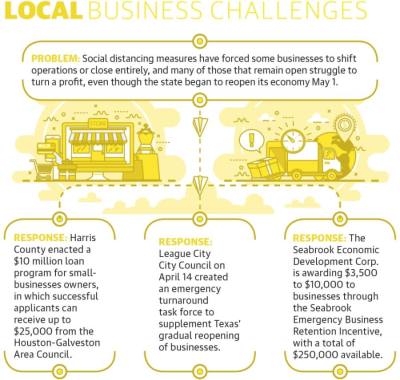The Clear Lake High School student said as social opportunities have been canceled, she and her friends have started meeting from their cars, conversing from atop their trunks. They mail each other letters, too.
Not only seniors are suffering. At the elementary level, some teachers are connecting with students by delivering “my teacher misses me” signs.
Hromadka and her family dressed up and took photos in their home April 4—what would have been prom night. With her time as a Clear Creek ISD student coming to a close, there is a palpable sense of loss, she said. She will not get to spend another lunchtime with her friends or sit in the classrooms of her favorite teachers.
“We’re all learning how to cope with the fact that we’re losing all of these milestones that we’ve been looking forward to since kindergarten,” she said. “We’re losing something we can’t get back.”
With work, school and social activities all restricted, residents have had to adapt their day-to-day activities as state and federal officials race to mitigate the spread of the coronavirus. Amid the global crisis, Bay Area residents have found ways to continue supporting one another from a safe distance.
Remote instruction adjustment
CCISD Superintendent Greg Smith said Texas schools remaining closed for the rest of the academic year—which Gov. Greg Abbott announced April 17—is bittersweet. It provides a sense of certainty in terms of the facilities, but it also means distance learning and its accompanying roadblocks will continue.
“Every day is something new, and we feel like we’re building the airplane while it’s flying in the air,” Smith said.
Smith said the district is grappling with various logistical challenges, such as ensuring thousands of library books are returned and getting students the supplies left behind in desks and lockers. Moreover, it is a challenge keeping every student engaged.
Smith recalled a senior emailing him in mid-April, expressing fear he might not graduate. This student works at a local grocery store and said he virtually stopped doing schoolwork as the virus continued to spread. Students like him should not be held back because of today’s circumstances, Smith said, and they are some of the ones he worries for most.
Once school does resume as normal, the effects of the pandemic will not have subsided, he added; the trauma of the virus might mean some students are triggered by someone coughing or sneezing nearby. The district is planning to adjust accordingly when school starts, helping students build resilience so they are equipped to work through any difficulties.
“The social and emotional well-being of our kids and staff is going to be [priority one] when we return,” Smith said.
Communities in Schools—Bay Area, a nonprofit that provides school dropout prevention services to at-risk students in Clear Creek and Dickinson ISDs, has adapted its approaches to maintain connections with McWhirter Elementary School students during distance learning, Student Support Specialist Lindsey Hoffman said.
“CIS has made a commitment to not lose contact with its students,” Hoffman wrote April 14. “The school closing has allowed CIS to learn new ways to reach out to students and parents.”
The organization has done so through a trial-and-error process: CIS first tried emailing and mailing information to parents about resources and support, but low response rates led them to switch to the platform itslearning. CCISD staff can create pages and post files, make links to websites, make announcements, and send both individual and mass messages to students on itslearning, Hoffman said, so families can find all information from CIS in one place.
CIS staff at McWhirter created a training presentation for other CCISD schools to learn how to start itslearning courses for their campuses. Feedback has shown the training has helped to reach students and parents that have not responded back through other communication efforts, Hoffman said.
So far, CIS has reached out to over 570 families.
“These times are not easy, but CIS will be available to the students and parents of McWhirter, just like it always has been,” she wrote.
Business owners fear future
Despite the state beginning to reopen its economy May 1, many small business owners feel a sense of uncertainty as they struggle to turn a profit, and some have even reinvented their business offerings to adjust.
Talena Gulash, who owns Bio-Safetech in Webster, said in a Facebook message the residential side of the company’s construction business “came to a screeching halt.” The company switched gears, buying enough disinfectant to treat more than 30 million square feet, and it is offering cleaning services to businesses. Bio-Safetech uses an Environmental Protection Agency-registered, Centers for Disease Control-approved disinfectant that specifically kills enveloped viruses, including COVID-19, Gulash said.
Gulash and two other partners own another construction company, for which residential construction also came to a halt. Not being able to provide five full-time employees and several subcontractors with work has been difficult, Gulash said.
“This has obviously affected my family, but it has also affected the families of many who depend on me to give them work so they can provide for their families as well,” Gulash wrote. “That weighs heavily on me every day.”
At RapidWristbands.com, which is owned and operated in Clear Lake, the spring is usually peak business season with schools and event organizers ordering custom wristbands. The business has since moved to remotely producing face shields and respirators. The shields are sold for $5.95 each, which Marketing Director Lorena Hernandez said is the lowest price they can be sold for given production and material costs.
Printers have been running 24/7 with employees producing shields around the clock, Hernandez said. The business will continue making personal protective equipment after the coronavirus crisis subsides and plans to continue to add new PPE products as necessary.
“We knew the need was there, but we didn’t expect it to be this much,” Hernandez said. “PPE is a sister brand, and she’s here to stay.”
Cupcake Cachet owner Traci Dean said Valentine’s Day to graduation time is her business’s busy season, but the bakery has had to refund many prepaid orders with event cancellations. The bakery operated for a few weeks in March with restricted hours and eventually closed.
Dean said without some kind of funding assistance, Cupcake Cachet will not reopen.
“Every dollar I have ever earned is tied up in this business,” she said. “We’re hopeful, definitely, but reality is starting to set in with me, and I’m pretty scared.”
Mental health challenges
As Bay Area residents adjust to social isolation and deal with the effects of the coronavirus, local mental health experts said anxiety and depression are prevalent among their patients.
Attempting to work full-time and play a more teacher-like role in their children’s education is a stressor for many parents amid the pandemic, said Julia Poritz, a licensed psychologist at University of Texas Medical Branch Health. Families with an essential worker leaving the house every day are also struggling, as jobs that were not considered dangerous before now involve potential exposure to illness.
Even people who were fairly stable before the coronavirus outbreak are feeling increasingly anxious and depressed, she said. However, patients also tell her they are grateful for the increase in quality family time and are grateful to not be struggling alone.
“There’s just that overall comforting feeling that everyone is going through this shared experience together,” Poritz said. “I know that’s been a source of comfort for a lot of people.”
Isolation can exacerbate mental and emotional health issues for many people and greatly increase the risk of substance abuse, said Randy Brazzel, the CEO of New Dimensions Day Treatment Centers. New Dimensions, which has various Houston-area locations, offers psychiatric substance abuse programs for adults and adolescents.
Many people develop addictions early on in life, so they may lack the necessary coping skills to properly navigate trauma, Brazzel said. Any event so overwhelming that it overrides one’s ability to cope—including a pandemic—can cause post-traumatic stress disorder in a person, Brazzel said.
To that end, he added that more challenges can be expected once normalcy returns and people try to go about their lives. Picking up the pieces of a traumatic event will be difficult for many, he said.
“We anticipate the impacts are going to be long-lasting,” Brazzel said.







